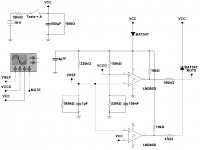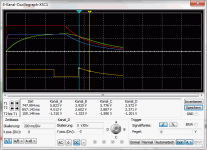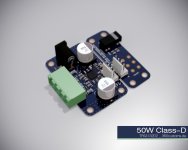Well here 20 or 26 db gain with 1uF film and even with 2.2uF film gives a little difference for some bass, chinese 1uF ceramics really make a difference in attenuating bass as also some people noted for ac1308 greenboards, maybe because inputcapacitor is in serie with outputcapacitor source too
Hi, YBDZ boards I assume?
Free Shipping! 4pc TPA3116 Class D digital amplifier 50W +50 W with Silent Sleep Design-in Other Electronic Components from Electronic Components & Supplies on Aliexpress.com | Alibaba Group
If so, can these be modified to work in PBTL mode? I'd like to use them in a sort of "active speaker" mode. placing these in an enclosure with a power supply and plug for inputting a microphone signal.
Thank you.
I hope those pictured are the same as these?Which "Green board" are you referring to? Please use the KJA2013 cheat sheet:
Interestingly, my YBDZ as deliverd is actually blue 🙂
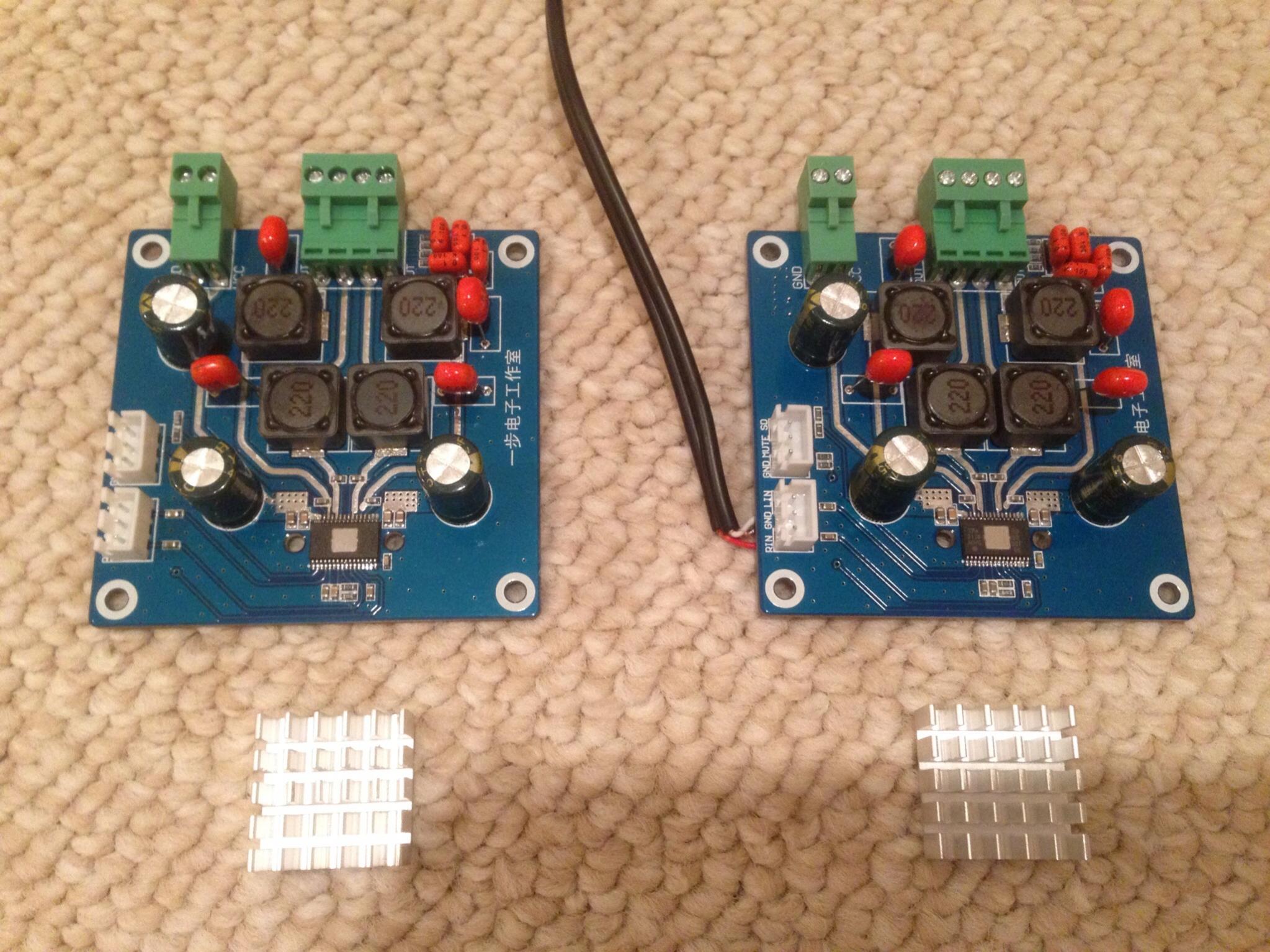
Free Shipping! 4pc TPA3116 Class D digital amplifier 50W +50 W with Silent Sleep Design-in Other Electronic Components from Electronic Components & Supplies on Aliexpress.com | Alibaba Group
If so, can these be modified to work in PBTL mode? I'd like to use them in a sort of "active speaker" mode. placing these in an enclosure with a power supply and plug for inputting a microphone signal.
Thank you.
-3dB at 12hz, where is -0.5dB then, probably a little high for home audio? my inroom respons is roughly from 30hz, or at least my speakers make a lot of noise pretending to produce generators 35hz and up, not really something below 30hz that I can hear coming from speaker.
So why wasting energy and stress your speakers if you can't hear it? 😀
Well here 20 or 26 db gain with 1uF film and even with 2.2uF film gives a little difference for some bass, chinese 1uF ceramics really make a difference in attenuating bass as also some people noted for ac1308 greenboards, maybe because inputcapacitor is in serie with outputcapacitor source too
20dB and 26dB have different impedances (60k vs. 30k), so it's normal and following 1/(2*pi *r*c). So not to blame any caps.
YBDZ can be made PBTL like all other boards, green ac1308/audiobah/yj copy is prepared for pbtl like hiampboards I have.
difference would be same as half capacitor value, if so 1uF/2.2uF film both have audible limitation bass extension on my speakers when changing 20 to 26 db20dB and 26dB have different impedances (60k vs. 30k), so it's normal and following 1/(2*pi *r*c). So not to blame any caps.
pink floyd: the fletcher memorial home
your FM/FR have nice strong bass🙂 but also reduce cymbals towards end of this song to undefined noise here
Last edited:
If your are using MLCC, you should have a look onto capacitance-chance by bias-voltage. When using the same sized footprints, capacitance change might be higher for the 2u2 compared to the 1u when using same rated voltage.
Beside this,
how about the following should avoid pop-on/off while delay not scaling with VCC.
Beside this,
how about the following should avoid pop-on/off while delay not scaling with VCC.
Attachments
your FM/FR have nice strong bass🙂 but also reduce cymbals towards end of this song to undefined noise here
Are you refering to panasonic electro-caps?
how do they achieve that?
by high r.c.?
by low esr?
would any other cap with similar specs do the same?
how about chemicon kzn?
We were talking about bass extension input capacitors. Powerfull bass however also is influenced by electrolytics on rail or decoupling and I couldn't resist when mentioning song that shows limits in bass extension input capacitors to also re mention favoured(by some) capacitors by Panasonic that also badly affect toptreble performance on 3116ampboards.Are you refering to panasonic electro-caps?
how do they achieve that?
by high r.c.?
by low esr?
would any other cap with similar specs do the same?
how about chemicon kzn?
Regular wet K-series Chemicons in my opinion are best choice for full range 3116 ampboards.
i have 470uF chemicon kze onboard for a subwoofer amp.
that was a big improvement compared to the stock caps.
i squeezed some 1500uF radial lead caps into the enclosure right between the dc-jack and the power input of the board.
i neither know the brand nor if they make any difference soundwise.
...but i have some kzn 2700uF an 4700uF here.
my plan is to upgrade my power supplies with them.
i think about putting some of them into the enclosure of my 24v smps.
maybe i'll also build a box for my sla batteries and add some caps.
does that make sense?
where should which caps go?
that was a big improvement compared to the stock caps.
i squeezed some 1500uF radial lead caps into the enclosure right between the dc-jack and the power input of the board.
i neither know the brand nor if they make any difference soundwise.
...but i have some kzn 2700uF an 4700uF here.
my plan is to upgrade my power supplies with them.
i think about putting some of them into the enclosure of my 24v smps.
maybe i'll also build a box for my sla batteries and add some caps.
does that make sense?
where should which caps go?
I bought one of these 2.1 boards ("Verst") and am getting terrible hissing and whistling in the left channel (I changed power supplies, sources, and speakers, so I know it's the board). The seller hasn't been too helpful with diagnosing the problem. Any thoughts?
12V 50WX2 100W TPA3116D2 2 1 HiFi Digital Subwoofer Amplifier Verst Board | eBay
12V 50WX2 100W TPA3116D2 2 1 HiFi Digital Subwoofer Amplifier Verst Board | eBay
I bought one of these 2.1 boards ("Verst") and am getting terrible hissing and whistling in the left channel (I changed power supplies, sources, and speakers, so I know it's the board). The seller hasn't been too helpful with diagnosing the problem. Any thoughts?
...
Board ground not connected to source ground?
I couldn't find my data sheet so I downloaded a new one and it looks like they added some updates:

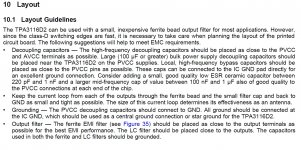
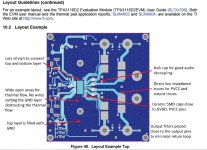
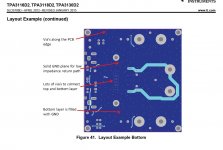
So a Weiner for me is still the 3116 eval PCB [FULL functionality!😎] (with redesigned or hacked input for bigger input caps and balanced input )
)
http://www.diyaudio.com/forums/class-d/267039-proper-tda3116-pcb.html
Any other Weiners these days?
Cheers and thanks, Jeff




So a Weiner for me is still the 3116 eval PCB [FULL functionality!😎] (with redesigned or hacked input for bigger input caps and balanced input
 )
)http://www.diyaudio.com/forums/class-d/267039-proper-tda3116-pcb.html
Any other Weiners these days?
Cheers and thanks, Jeff
I couldn't find my data sheet so I downloaded a new one and it looks like they added some updates:
View attachment 460404
View attachment 460405
View attachment 460406
So a Weiner for me is still the 3116 eval PCB [FULL functionality!😎] (with redesigned or hacked input for bigger input caps and balanced input)
http://www.diyaudio.com/forums/class-d/267039-proper-tda3116-pcb.html
Any other Weiners these days?
Cheers and thanks, Jeff
To be completely anal, TI EVM doesn't use correct values for PVCC decoupling, needed are high freq between 220pF and 1nF, the 1nF cog is perfect, BUT mid decoupling needed is between 100nF and 1uF, 100nF 0603 classII ceramic with any DC applied is <100nF, no Wiener 😀
To be completely anal, TI EVM doesn't use correct values for PVCC decoupling, needed are high freq between 220pF and 1nF, the 1nF cog is perfect, BUT mid decoupling needed is between 100nF and 1uF, 100nF 0603 classII ceramic with any DC applied is <100nF, no Wiener 😀
Sounds like an easy fix.
Tell me more, kind sir.
Do you have a Weiner? 😉
Funny that EVM doesn't follow TI own guidelines for decoupling, some others have mentioned, can't remember where I read it, that gnd layout EVM isn't very good or easily improved upon. So bit expensive board that isn't optimal, it seems. TI themselves have mentioned that improving SQ would mean replacing classII ceramics for film/mkp, so maybe hacking up a cheap pcb for modding is better investment anyway. Maybe for 1200khz operation Sure3116 massive number of caps decoupling effort has benefits? Maybe pcb was 1200khz Tripath befor becoming 3116 ? Not that I remember seeing any such number of caps for decoupling in any Tripath document, but my memory might be bad.
To be completely anal, TI EVM doesn't use correct values for PVCC decoupling, needed are high freq between 220pF and 1nF, the 1nF cog is perfect, BUT mid decoupling needed is between 100nF and 1uF, 100nF 0603 classII ceramic with any DC applied is <100nF, no Wiener 😀
1nF is perfect because YOU say so? If this would be perfect in any way, why TI suggest values between 220pF - 1nF? Decoupling is highly dependet on board-design/layout and the right value for a given layout will normally be determined empirical. Especially when normal traces are in the range of several pF.. 🙄
Seeing some superficial knowledge here.

For sure, decoupling at a standard China-Board will be different than on a tightened layout like attached. (Smaller loops, smaller return paths)
Attachments
Last edited:
- Home
- Amplifiers
- Class D
- TPA3116D2 Amp
